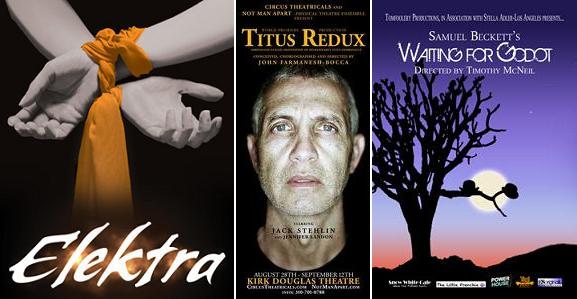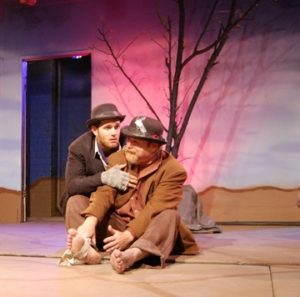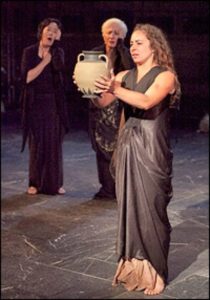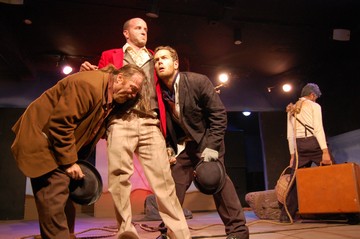
WHAT HAVE THEY DONE TO OUR CLASSICS?
 You can fragmentize a familiar Shakespeare play like Macbeth, if you have a clear concept of what you want to do with it and then give it a witty and inventive production, as was proven recently when Psittacus Productions presented A Tale Told By An Idiot, but if you take a less familiar work like Titus Andronicus, which most scholars consider Shakespeare’s worst play (partly because its shocking imagery almost always overwhelms the playwright’s usually great poetic sense), and try to fill it with all sorts of contemporary allusions about our role in the Iraq war, and only muddy it up with a surfeit of half-digested ideas, as was done in Titus Redux (or Titus Reductio Ad Absurdum, which would have been a more accurate title), you’re in deep, deep trouble.
You can fragmentize a familiar Shakespeare play like Macbeth, if you have a clear concept of what you want to do with it and then give it a witty and inventive production, as was proven recently when Psittacus Productions presented A Tale Told By An Idiot, but if you take a less familiar work like Titus Andronicus, which most scholars consider Shakespeare’s worst play (partly because its shocking imagery almost always overwhelms the playwright’s usually great poetic sense), and try to fill it with all sorts of contemporary allusions about our role in the Iraq war, and only muddy it up with a surfeit of half-digested ideas, as was done in Titus Redux (or Titus Reductio Ad Absurdum, which would have been a more accurate title), you’re in deep, deep trouble.
 One minute the title character is talking about returning to ancient Rome from the wars, and the next minute he is in a suburb somewhere in an America that looks suspiciously like sitcom land. There’s artfully photographed film which is striking but seriously distracting. There’s ballroom dancing. There are tableaux vivants of brutal amputations which might have been visually impressive if seen from a proper distance but which, from a vantage point too close to the stage, looks like theatrical fakery, which, of course, it is. And, because the fragmentation robs the work of even a semblance of what we call continuity, even actors, who are clearly talented, cannot enrich their roles with subtle shading or nuance. In other words, despite its avant-garde trimmings, Titus Redux ends up looking like a lot of Hollywood types at a slumming party they call experimental theater. Since Circus Theatricals and Not Man Apart, whose joint production this was, have solid reputations, this reviewer cannot say if they have been overpraised in the past or if this was just a misfire for them.
One minute the title character is talking about returning to ancient Rome from the wars, and the next minute he is in a suburb somewhere in an America that looks suspiciously like sitcom land. There’s artfully photographed film which is striking but seriously distracting. There’s ballroom dancing. There are tableaux vivants of brutal amputations which might have been visually impressive if seen from a proper distance but which, from a vantage point too close to the stage, looks like theatrical fakery, which, of course, it is. And, because the fragmentation robs the work of even a semblance of what we call continuity, even actors, who are clearly talented, cannot enrich their roles with subtle shading or nuance. In other words, despite its avant-garde trimmings, Titus Redux ends up looking like a lot of Hollywood types at a slumming party they call experimental theater. Since Circus Theatricals and Not Man Apart, whose joint production this was, have solid reputations, this reviewer cannot say if they have been overpraised in the past or if this was just a misfire for them.
 But it was nowhere near as awful as the revival of Samuel Beckett’s Waiting For Godot at Stella Adler which had no business opening for a paying audience. It felt like one of those student productions to which only friends and relatives of the cast should have been invited. I do not usually review plays which I do not see through to the end, but, when I left at intermission, the first act had lasted almost as long as any production I’ve seen of the entire play. And I have it on excellent authority that things did not get better. This is the most wrong-headed and amateurish revival the play has probably ever received. How can one of the greatest plays of the twentieth century be turned into one of the most excruciating theater experiences of all time? Let’s just say that, every so often, it happens. And it is time that one realizes that, despite the wonderfully rich humor that bursts from this work, it is essentially a poem of despair and not a knockabout farce.
But it was nowhere near as awful as the revival of Samuel Beckett’s Waiting For Godot at Stella Adler which had no business opening for a paying audience. It felt like one of those student productions to which only friends and relatives of the cast should have been invited. I do not usually review plays which I do not see through to the end, but, when I left at intermission, the first act had lasted almost as long as any production I’ve seen of the entire play. And I have it on excellent authority that things did not get better. This is the most wrong-headed and amateurish revival the play has probably ever received. How can one of the greatest plays of the twentieth century be turned into one of the most excruciating theater experiences of all time? Let’s just say that, every so often, it happens. And it is time that one realizes that, despite the wonderfully rich humor that bursts from this work, it is essentially a poem of despair and not a knockabout farce.
And so, it was with great relief to be at the amphitheater of the Getty Villa, and, within the first few moments of Sophocles’ Elektra, feel that one is in the hands of professionals. It took little more than Geoff Korf’s warm lighting delicately folding around Theresa Wong’s elegant cello-playing to assure us that the rest of the evening would be easy sailing. And, indeed, this was not only a compelling experience but a grandly entertaining one as well. It will be remembered as the Elektra in which Pamela Reed sank her teeth into the role of Clytemnestra with a relish that was absolutely thrilling to behold; her every movement, her juicily resplendent phrasing, her control of every bit of cunning and malice as a reasonable explanation of her treatment of Elektra, her regal hauteur and her all-too-human rage was all part of what may be one of the finest examples of classical acting one might ever come across. And it is also one of the finest displays of sheer vicious bitchery. Almost as good, though in a totally different vein, is Olympia Dukakis’s Chorus Leader, who brings to the play solid grounding, a reservoir of pained experience, and a warmth that never descends into sentimentality. So much good stuff cannot be praised highly enough.
 And, since the standard bearer of productions of Elektra – for this reviewer – is neither the National Theater of Greece production with Irene Pappas nor any formal translation of the classical text, but rather Joseph Chaikin’s pared-down, highly experimental three-character version with the great Michelle Collinson in the lead, one was expectant with anticipation to see what the highly talented Timberlake Wertenbaker had found in her translation.
And, since the standard bearer of productions of Elektra – for this reviewer – is neither the National Theater of Greece production with Irene Pappas nor any formal translation of the classical text, but rather Joseph Chaikin’s pared-down, highly experimental three-character version with the great Michelle Collinson in the lead, one was expectant with anticipation to see what the highly talented Timberlake Wertenbaker had found in her translation.
Well, sad to say, she has not been thoroughly successful; she seems bent on finding, for a contemporary audience, a kind of comedy to which audiences are more in tune with these days than tragedy. It would seem that true tragedy, as evidenced by the depth of grief and mourning in which Elektra buries herself, is beyond the reach and comprehension of a modern audience. It is a fluid and richly conversational translation, but it shies away from anguish. And it is not helped by the fact that, despite some superb acting, the director, Carey Perloff has not found a cohesive acting style for the cast she has gathered together. Annie Purcell’s Elektra does not seem so much a woman in tortured agony over the murder of her father and her need to avenge his death as much as she seems like a whining Jewish-American princess who enjoys a good fight with her adversaries. She may be a more understandable Elektra for today’s theatergoers, but she is not Sophocles’ Elektra. Why, once again, does despair prove so elusive? Are we afraid of it? Why are we more moved and more entertained by Clytemnestra than we are interested in the depths of Elektra’s anguish?
Still, this production is infinitely worth seeing as much for what it doesn’t do well as for what it does brilliantly. Professionalism still counts for something.
Sophocles’ Elektra
Getty Villa, the Barbara and Lawrence Fleischman Theater
Thurs-Sat at 8
ends on October 2. 2010
for tickets, visit Getty
photos by J. Paul Getty Trust
Waiting For Godot
Tomfoolery Productions
Stella Adler Theatre
ends on October 2, 2010
for more information, visit Stella Adler
photos by David Meistrich
Titus Redux
Circus Theatricals and Not Man Apart
Kirk Douglas Theatre
ends on September 12, 2020
for tickets, visit Circus Theatricals
photos by Ed Kreiger



